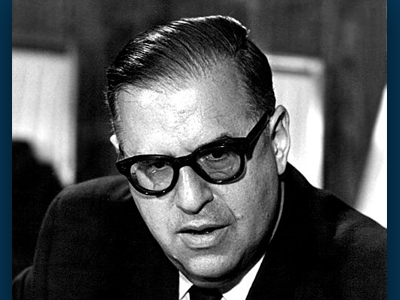February 2, 1915
Israeli politician, diplomat, historian and writer Abba Eban is born Aubrey Eban in Cape Town, South Africa. He is raised in England after his family moves there while he is an infant. He studies Oriental languages at Queens College, Cambridge.
After serving on the staff of the British minister of state in Cairo during World War II, Eban moves to Jerusalem in 1944. He becomes the chief instructor in the Middle East Center for Arab Studies and trains Jewish volunteers. Declining an invitation to run for the British Parliament, Eban goes to work for the Jewish Agency. He joins its delegation to the United Nations, where he plays a leading role in the passage of the U.N. partition plan for Palestine, Security Council Resolution 181. He is Israel’s first ambassador to the United Nations and serves simultaneously as ambassador to the United States from 1950 to 1959.
Eban is elected to the Knesset in 1960 and serves as the education minister and deputy prime minister before becoming foreign minister in 1966. He remains in the Knesset until 1988.
In addition to his diplomatic service, Eban has a distinguished career as a scholar. His landmark American television series, Heritage: Civilization and the Jews, is seen by an estimated 50 million people on PBS in 1984.
Despite having a superb international reputation abroad as an articulate spokesman for Israel, Eban does not always get along with Israeli prime ministers, some of whom feel that his suggested diplomatic solutions are too mild for foreign relations requiring the use of force and strength. His Oxbridge English accent gives his oratory great value against Israel’s many critics, particularly after the Six-Day War in June 1967.
Henry Kissinger writes of Eban in The White House Years (New York: Simon and Schuster, 1979, p. 359): “I have never encountered anyone who matched his command of the English language. Sentences poured forth in mellifluous constructions complicated enough to test the listener’s intelligence and simultaneously leave him transfixed by the speaker’s virtuosity.”









